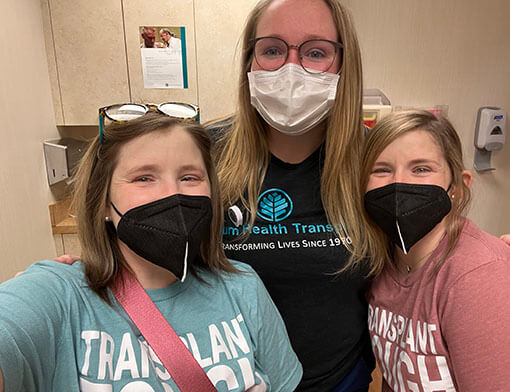Sometimes, the stereotypes are true. Fraternal twins Amelia Stewart and Ashtin Stutts are, in Amelia’s words, “super duper close, all the time.”
That bond helped them as children when they were diagnosed with Type 1 diabetes and navigated a childhood that included checking blood sugar levels and only grew deeper as they became adults. Most recently, that bond supported them through three transplants in less than four years.
In Type 1 diabetes, which has no cure, the pancreas produces little to no insulin and the kidneys can become damaged, sometimes severely. In January 2019, Ashtin received a kidney-pancreas transplant and Amelia was right beside her, cheering her on. Neither sister had any inkling that their journeys – taken together but playing out so differently – were just beginning.
Two things that were the same for each sister: their love for each other and the quality of care they received from surgeon Dr. Roger Denny and Atrium Health Carolinas Medical Center, named the Best Hospital in the Charlotte region by U.S. News & World Report for five years in a row.
“When I say this, I mean it with my whole heart. I honestly can't talk enough about Dr. Denny, Atrium Health, his staff, the nurses, CMC, everything. They are just top notch in all the way,” says Ashtin. “It was honestly the best experience, even though I was so sick the first time.”
“Dr. Denny is just a lifesaver,” Amelia concurs. “He is amazing. I trust him with anything, so I wasn’t nervous [before surgery] because I knew he was doing it.”
The sisters were very familiar with Atrium Health Levine Children’s Hospital, having spent time there over the years for their diabetes. So when they needed health care as adults, Atrium Health was their first choice.
“I didn’t even know that Atrium Health did transplants,” says Ashtin. “The relief I got from just knowing that they had their own transplant center … I wouldn’t have done it anywhere else. Atrium Health is just top notch everything.”
Ashtin's Story

Ashtin says everything leading up to her transplant went well – she was on the waiting list a short time and even worked right up until the day of her surgery.
“I got a call at 2 o’clock that I was on standby, and then at 3 p.m., I’m not on standby anymore,” she says. “Then at 5:30 p.m., they called and said never mind, you need to come to the hospital, and by midnight I was in the operating room.”
Her recovery, however, was another story. Ashtin had several complications that delayed recovery and left her feeling so sick she was on medical leave from her teaching job until that August.
Life smoothed out for a while, then in January 2021, Ashtin came down with COVID-19 on top of a viral infection that sometimes happens to people taking immunosuppressant drugs after a transplant. The combination took out her transplanted kidney and she had to start dialysis.
Meanwhile
Amelia’s kidney function dropped rapidly starting in the summer of 2019. By that November, it was down to 20% and she was feeling sick and easily fatigued. In March 2020, she started dialysis four days a week – at the same time her job teaching special education went virtual for the COVID-19 pandemic. She made it work through the end of the school year but by fall, she had to go on medical leave.
“Anything that could have happened to someone during dialysis or before transplant happened to me,” says Amelia. That included having her appendix removed, eye surgery and other complications – including COVID – that kept delaying the possibility of a transplant.
Finally, in spring of 2022, Amelia’s kidney-pancreas transplant happened.
“My sister waited two months the first time for her transplant and I waited two years,” Amelia laughs. “Dialysis was terrible [for me]; I wouldn’t wish that on my worst enemy. I was so sick during that and it was just miserable.”
Amelia was nervous about coming home after the transplant because she had seen how sick Ashtin was after hers. However, Amelia quickly felt like a new person and even started earning her master’s degree in social work during her recovery. Although she loves her students and will miss them, she is considering becoming a transplant social worker – in part because of her positive experience with Atrium Health.
A second Kidney, a Third Chance
After Ashtin’s first transplanted kidney failed in January 2021, she began dialysis. Because she was able to do dialysis at home instead of at the clinic, she continued to work with few problems. In fact, she took a new job as a school counselor in June 2022 … right before getting the phone call in July that a match had been found.
Denny and Dr. Vincent Casingal performed Ashtin’s second kidney transplant, and fortunately, her second recovery was completely different. In fact, she felt so good and did so well, she returned to work in early October – with precautions including masks, hand sanitizer and limiting the number of children in her office at one time.
Better Together
Both Amelia and Ashtin are glad they had each other, Denny and the nurses and staff at Atrium Health during dialysis, transplants and recovery, and they are thankful for all the support they received from family and friends.
“We had dialysis to help us and get us to a transplant, but there are people who don’t or who have been on dialysis for years,” says Ashtin. The sisters were humbled and overwhelmed by the people they know who became organ donors after seeing the impact on the sisters’ lives. They want to make more people aware of the importance of organ donation.
“Life is a gift; don’t take it for granted,” says Ashtin. “We have been just blessed and are so thankful.”
Article updated 4/10/2023



